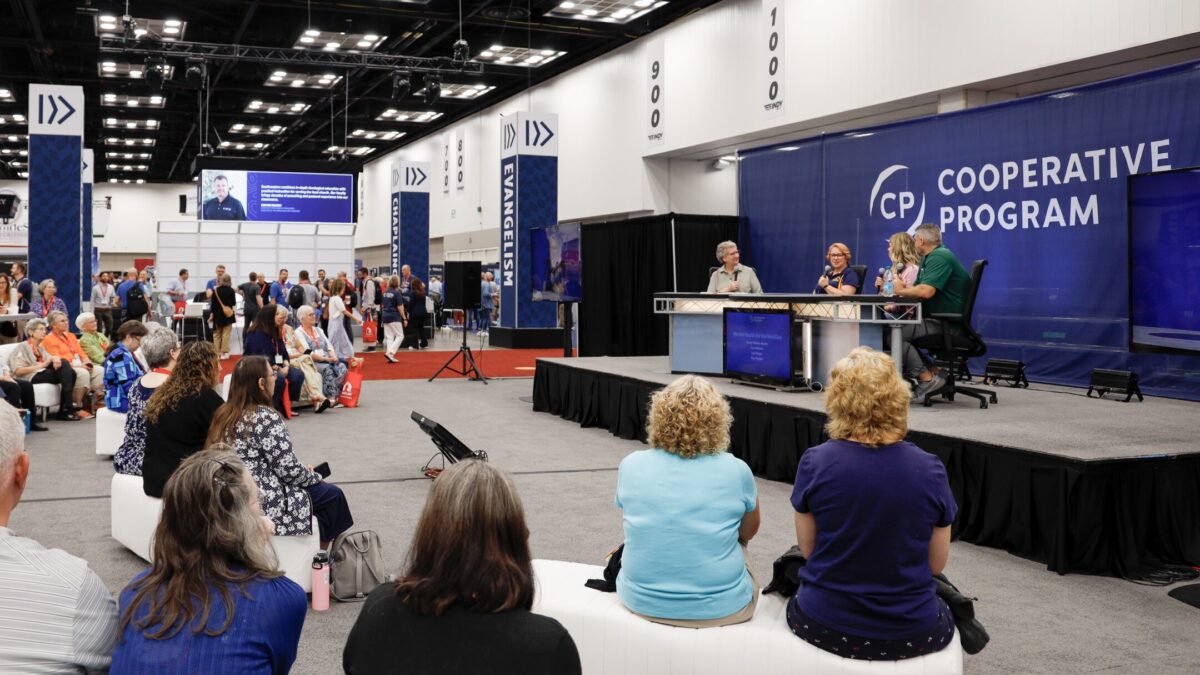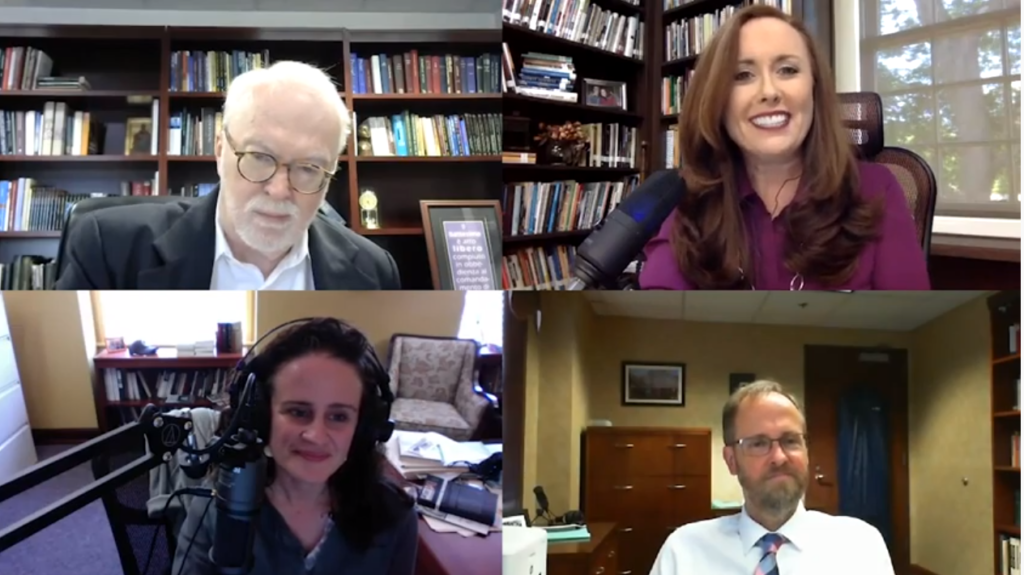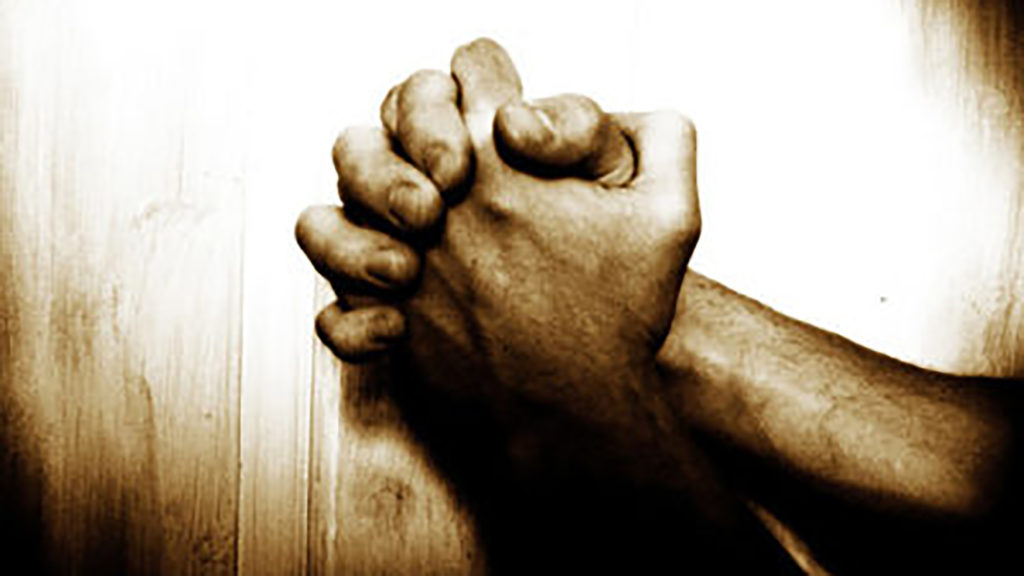Sandy Wisdom-Martin, executive director-treasurer for National Woman’s Missionary Union, led a conversation about mental health on the CP Stage in the exhibit hall on June 10 prior to the start of the Southern Baptist Convention Annual Meeting in Indianapolis.
Joining her were Gay Williams, director, with her husband, of Hawaii Baptist Disaster Relief in Honolulu, and Julie and Ryan Busler, who have served as missionaries in Canada, Mexico, Germany and Turkey.
Julie Busler, currently serving as the WMU president in Oklahoma, authored the book, “Joyful Sorrow: Breaking through the Darkness of Mental Illness,” which is a featured resource of the WMU’s Project Help: Mental Health, an initiative that seeks to raise the level of awareness of mental health and provide practical approaches anyone can implement to open the door for meeting needs and sharing the gospel.
In the book, Julie Busler vulnerably and transparently shares about when she found herself in a mental health hospital while serving overseas. The mother of four was experiencing depression and post-traumatic stress disorder.
Describing how she felt she would never get better, Busler said she hadn’t told anyone at first, but things worsened, and she finally shared, later agreeing to accept and cooperate with doctors with good success.
“Yes, medicines and therapy are excellent gifts,” she affirmed, noting the importance of Jesus’ healing as well. “There is no shame in accepting help.”
Shining the light
Acknowledging that being in ministry added a layer of difficulty to the matter, Busler said she finally came to the realization that “God uses broken, ordinary people to shine His light.” She pointed to the value in a pastor who may have struggled with depression. “No one will shepherd a flock like someone who has been in the valley,” she said.
Her husband Ryan, serving as her caregiver, said it took a while for him to realize that his first calling was to his wife, not ministry. “It was worth it every time” he put her in front of the ministry, he said, though he admitted he didn’t always get it right. But he took his role as advocate and encourager seriously.
Williams served in the aftermath of the devastating 2023 Maui fires, providing help, hope, and healing to displaced residents through disaster relief.
“I helped them sift through the ashes, I shared the hope that tomorrow will be a new day, and I shared the ultimate healing found in Jesus Christ,” she said, explaining how children lost their schools, and lives were completely changed in one day.
In response to Wisdom-Martin’s question about whether there was a rise of mental health issues or just a rise in the awareness of mental health issues today, Williams said the COVID-19 pandemic precipitated a lot of issues.
Media concerns
She also expressed concern about social media and its effect on children, youth and young children, noting there is pervasive loneliness, and suicide is the second leading cause of death among those aged 10–14.
Wisdom-Martin noted how mental health also affects the SBC’s unified giving program, the Cooperative Program, which fuels funding for campus ministers, Baptist children’s homes, and missionaries and their families all over the world.
Yet, the panelists said, the younger generation is more willing to talk about what they are feeling and are embracing authenticity. They understand that it is OK to feel and to say they need help.
Ryan Busler added, “We need to normalize the conversation and break the stigma” of poor mental health. “As parents and ministers, we need to do everything we can to facilitate these conversations.”
Julie Busler added that it is OK to not appear perfect in front of others, especially one’s children. It helps them to understand that “Mom does struggle, but her hope is in Jesus Christ,” she said.
Her husband agreed. “It is so hard to struggle when everyone else is so ‘perfect.’”
Williams shared about the fear many people face about helping others in mental health crisis. “Our basic nature is to want to help, like we do when people have physical help issues, but in mental health, we don’t know how to,” she said, suggesting that providing meals for patients is a good first step.
Know your limits
Julie Busler urged listeners to be trained to know what they can do but to also know when to refer a person to the emergency room.
Williams agreed, urging them to be honest and to listen, “because we all need people to hear us.”
“And that is something all of us can do,” affirmed Wisdom-Martin.
To learn more about WMU’s Project Help initiative, visit wmu.com/compassion-ministries/project-help-mental-health.
EDITOR’S NOTE — This article was written by Shannon Baker, director of communications for the Baptist Resource Network of Pennsylvania/South Jersey and editor of the Network’s weekly newsletter, BRN United.






Share with others: